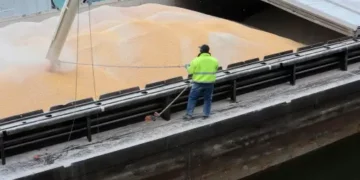According to Cereals Canada, a revised quarantine pest list that no longer includes creeping thistle will become effective on September 29th. This decision comes after concerted advocacy efforts from Canada’s government and agriculture industry. As a result, Canada will be able to resume bulk wheat shipments to Vietnam for the first time since 2018.
Creeping thistle, also known as Canada thistle, is a fast-growing weed that can have detrimental effects on crop yield by competing for nutrients and sunlight with other plants. It can also reduce grazing lands for livestock.
The 2018 phytosanitary restrictions had put agricultural exporters at risk of commercial penalties if creeping thistle was detected in their cargo. Consequently, direct trade with Vietnam declined, especially from Canada. In 2021, Canada’s wheat exports to Vietnam dropped to just over 20,000 metric tons, a significant decrease from the annual average of 200,000 metric tons before the restrictions were imposed.
Dean Dias, CEO of Cereals Canada, expressed optimism about this positive development, stating, “With this positive development, we look forward to the resumption of regular cereals trade between Canada and Vietnam.”
The eased import restrictions will enable traders to import directly from Canada and Russia, both of which were previously major suppliers of wheat to Vietnam. While Australia continues to be the largest wheat supplier to Vietnam, the United States has seen an expansion in trade in recent years following the lifting of wheat tariffs in 2021.
This development is expected to have a favorable impact on U.S. and Canadian shippers, with potential benefits for the bulk demand of Canadian wheat in particular, according to a grains trader based in Singapore.
Find the latest supply chain report news at The Supply Chain Report. For international trade tools, see ADAMftd.com.
#CerealsCanada #VietnamWheatTrade #CanadaVietnamTrade #WheatExports #AgricultureAdvocacy #CreepingThistle #BulkWheatShipments #CanadaAgriculture #VietnamTrade #AgriculturalExports #GrainsTrade #PhytosanitaryRegulations #USWheatTrade #TradeResumption #AgriculturePolicy

















